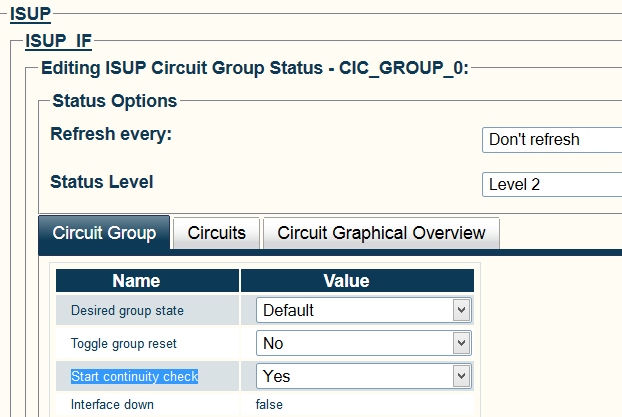Outgoing Continuity Testing
From TBwiki
(Difference between revisions)
Nicole Tan (Talk | contribs) m (moved Outgoing COT testing to Outgoing Continuity Testing: COT is not a right term) |
|||
| (One intermediate revision by one user not shown) | |||
| Line 6: | Line 6: | ||
| − | It is also possible to do | + | And then |
| + | <pre> Apply States </pre> | ||
| + | |||
| + | This will send a ISUP CCR messages with the CIC value of these circuits, for every circuit in the group, and will send tones in-band that will be detected if the remote device has put itself in loopback. <br /> | ||
| + | The results will be shown in the Status page: | ||
| + | <pre> Last ccr success cnt </pre> | ||
| + | or | ||
| + | <pre> Last ccr fail cnt </pre> | ||
| + | |||
| + | <br /> | ||
| + | |||
| + | It is also possible to do COT testing per circuit by clicking on '''Circuits''' | ||
== Related Links == | == Related Links == | ||
Latest revision as of 14:38, 24 April 2014
This new feature for version 2.7 allows users of the TMG unit to generate out of call SS7 ISUP Continuity Tests. Continuity tests are used to make sure that the SS7 ISUP interface circuit groups (CIC) are aligned with the physical links (E1/T1)
To do so, go the ISUP interface Circuit group:
Status -> SS7 ISUP -> Select Circuit Group -> Start continuity check -> Yes
And then
Apply States
This will send a ISUP CCR messages with the CIC value of these circuits, for every circuit in the group, and will send tones in-band that will be detected if the remote device has put itself in loopback.
The results will be shown in the Status page:
Last ccr success cnt
or
Last ccr fail cnt
It is also possible to do COT testing per circuit by clicking on Circuits
